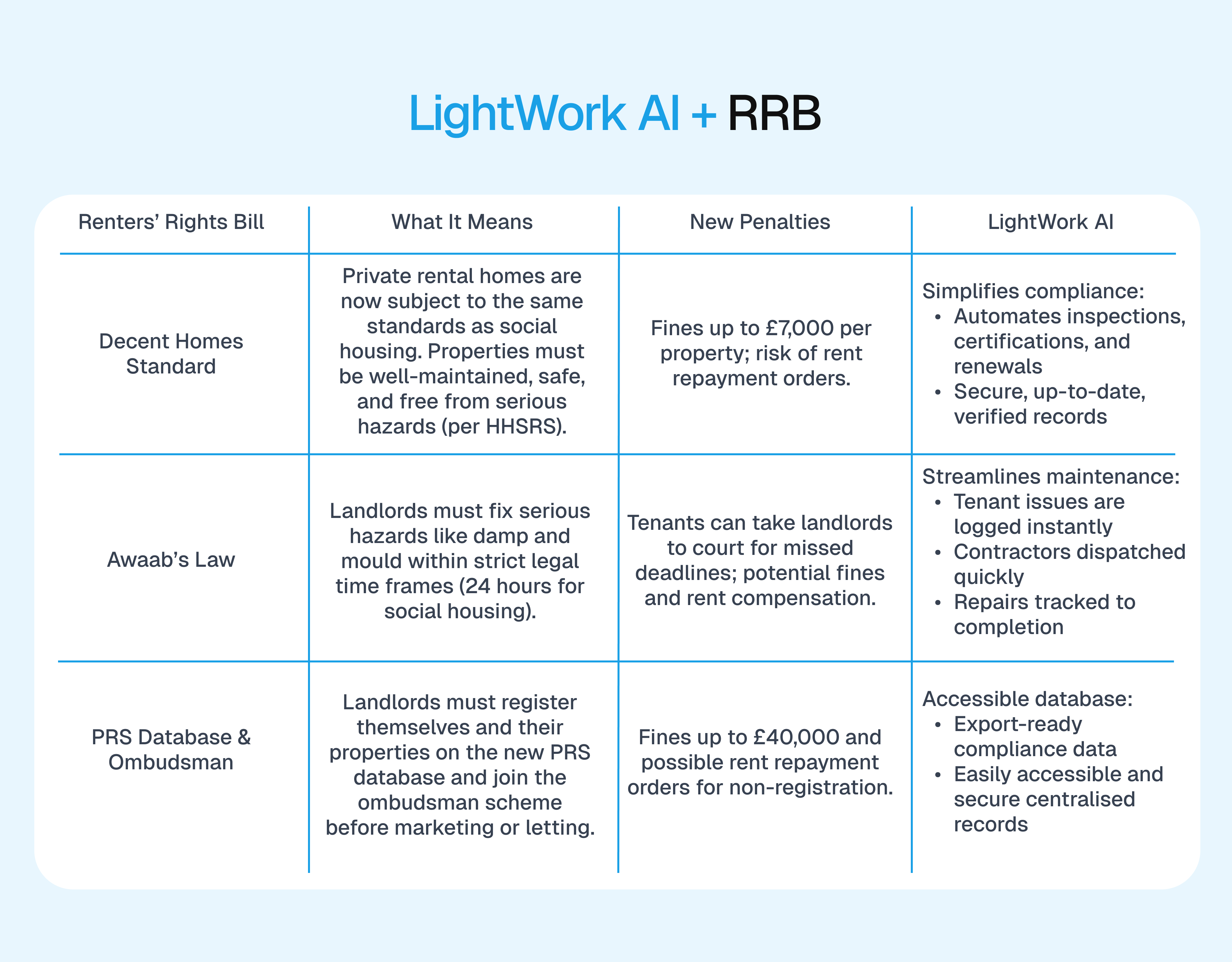What the 2025 Renters’ Rights Bill Means for Landlords & Property Managers
The Renters’ Rights Bill is the most significant reform in private rental legislation in years. It introduces stricter compliance duties, higher maintenance standards, and tougher penalties for landlords, while giving tenants stronger protections and ensuring homes are safe and well-maintained.

What is the Renters' Rights Bill?
The Renters’ Rights Bill is the biggest shake-up in private rental legislation for years. For landlords, it introduces new compliance duties, tighter maintenance standards, and higher penalties for non-compliance. For tenants, it promises stronger protections and ensures homes are safe and well-maintained.
If you’re a private landlord or property manager, here’s what you need to know.
When Does It Come Into Effect?
The Bill is now in its final parliamentary stages and is expected to become law in autumn 2025. The initial reforms will apply to all new tenancies from early 2026, while the larger changes, including the Decent Homes Standard, are likely to follow later in the year.
In other words, the window for preparation is short. Landlords should act now to establish new systems before the rules are enforced.
Key Changes for Landlords
The Bill introduces a series of new obligations for private landlords, with some of the most significant centred on compliance and maintenance standards. These rules are backed by tougher penalties, making it essential for landlords to stay up to date and aware of the upcoming changes.
The reforms are designed to improve accountability and raise housing standards across the private rental sector. Failure to comply will carry greater consequences, including civil penalties of up to £40,000 per property, possible criminal prosecution, and rent repayment orders. Tenants will also have stronger rights to challenge landlords in court, increasing the risk of legal costs and delays to repossession.
The biggest changes include:
- The Decent Homes Standard (DHS): higher minimum standards for all rental housing, per HHSRS standards.
- Awaab’s Law: strict legal deadlines for addressing serious hazards such as damp and mould.
- PRS Database & Ombudsman: mandatory landlord and property registration and new dispute resolution fees.
With the introduction of the Decent Homes Standard and Private Rented Sector Landlord Ombudsman it will become more difficult for landlords to avoid liability for any disrepair following a complaint from a tenant.
The table below lists three of the most significant changes, their penalties, and how LightWork AI can ease the compliance burden:

Upcoming Challenges
- Only 24% of landlords said they fully read the government guidance on the bill.
- 1 in 5 rental properties may not currently meet the new DHS.
- In 2024, the Property Ombudsman awarded £1.49 million to consumers in compensation and conducted more than 2,100 compliance audits.
- 31.7% of tenants still report poor maintenance and repairs as a major concern.
- 56% of landlords say incoming legislation is driving them to reduce their portfolios or exit the market.
- 76% of letting agents feel overwhelmed by regulatory changes, and 42% report lacking sufficient time to manage the workload.
These challenges highlight why having the right systems in place matters, and where emerging technology at LightWork AI can help ease the burden.
What Landlords Should Do Now
To prepare, landlords need systems that make compliance and maintenance efficient and reliable.
Landlord Compliance Checklist:
- Review the property condition: Survey for mould/damp, heating, smoke/CO alarms and fire safety.
- Improve record keeping: Maintain clear logs of repairs, inspections, and certificates.
- Act quickly on repairs: Awaab’s Law requires urgent responses to serious hazards.
- Use property management tools: software that can help track compliance and maintenance requests.
- Strong communication with tenants: minimises disputes, speeds up repairs, and improves overall tenant satisfaction.
How LightWork AI Can Help
LightWork AI is a platform that reduces the administrative burden of property management by automating compliance and maintenance tasks. By streamlining these processes, it frees landlords and property managers to focus on strategy and growth.
LightWork AI simplifies compliance and maintenance by automating tasks, such as:
- Inspections & renewals: automated reminders for compliance certificate renewals, contractor outreach and secure digital records.
- Maintenance: communication with tenants, instant logging of tenant issues, automatic contractor dispatch, and real-time repair tracking.
- Compliance data: export-ready and verified records.
The Renters’ Rights Bill will transform the private rental landscape. Landlords who adopt efficient processes for hazard reporting, faster repairs, and compliance management will avoid the harsh penalties and stay ahead of the changes.
With LightWork AI, landlords can stay organised, compliant, and be fully prepared for the evolving demands of property management in 2026.
Get In Touch
If you're interested in seeing LightWork AI in action, contact us or book a demo today.

